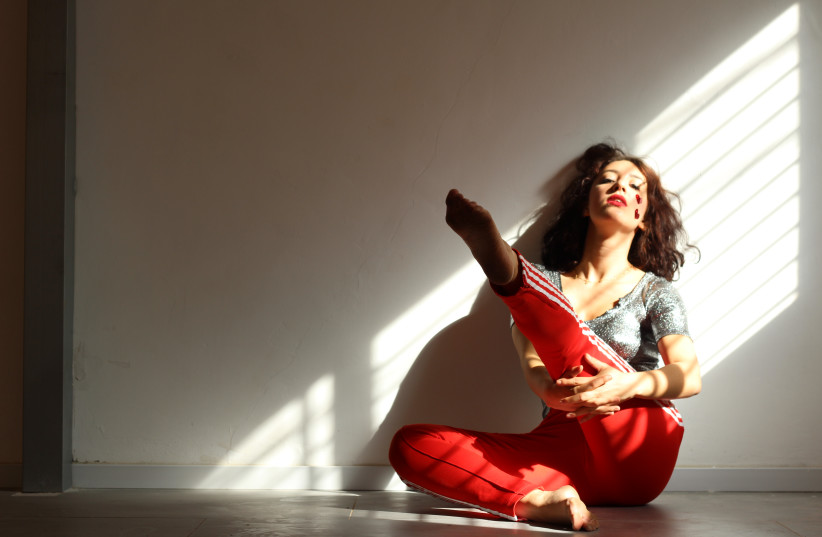Most dancers refer to their movement practice as a type of therapy. The studio is the place where dance artists can process their thoughts, release tensions in the body and work up the strength they need to navigate the outside world.
In Joy Bernard’s new solo, I Take Care of Myself (Je prends soin de moi), various types of therapy are encapsulated in a choreographic action, which is the underlying and overarching form of therapy in the piece.
“During the process, I reached out to female caretakers and therapists. There was a psychoanalyst, a speech therapist, a cosmetologist, a physical therapist and others. I asked each of them to diagnose me. Some of them gave me exercises to do and these became a choreography,” says Bernard over coffee at the newly renovated Delicatessen on Ibn Gvirol Street in central Tel Aviv. It is early evening, and the street is full of passersby, parents with their children grabbing a post-school snack, couples sipping coffee, and dogs on their afternoon walks. Bernard sits in a fluffy chestnut coat, her red lipstick and black curls creating a severely entrancing look.
It should be mentioned that Bernard’s age comes in sharp juxtaposition with her poise, life experience and eloquence.
Bernard, 25, has an expansive writing practice, including her work as a freelance art critic and culture reporter for several leading magazines and newspapers in Israel and abroad. She teaches English, Hebrew and movement. She is currently pursuing an undergraduate degree in art history at Tel Aviv University. She is also a curator of exhibitions and artistic happenings, and is currently writing her first book.

“I was a full-on journalist for seven years. I ran the newsroom at Haaretz. Before that, I worked at The Jerusalem Post. I quit all of that during corona.”
In releasing the full-time job structure that had sustained her until 2019, Bernard found an opportunity to reopen the long-sealed door to her dance practice.
“I had stopped dancing due to traumatic experiences. I only recently came back,” she shares. “I finally was able to tell myself that there is more than one way to dance, and I don’t have to dance only in specific places.”
She began taking dance classes and choreographing solos, such as You, Me and the Last War, which was presented as part of the Square 1 exhibition earlier in the year, which Bernard curated with Lital Megidish.
Bernard was born in Israel and grew up in Tel Aviv, extensively traveling with her family to the United States and Germany. She is currently based in Tel Aviv. Her father is a German psychoanalyst and her Israeli mother is a former movement and swimming teacher.
In I Take Care of Myself, Bernard holds a dialogue with her father. “He tells me being a dancer isn’t profitable,” she laughs.
Her father was a major catalyst in this creation, she explains.
“My father was very sick. He doesn’t always live in Israel, but he was here during that period. Around that same time, I ordered Sophie Calle’s book Prenez Soin De Vous (Take Care of Yourself), and I would sit in the hospital reading the book.”
In Calle’s exhibition in the Venice Biennale’s French Pavilion in 2007, which later became the aforementioned book, Calle sent a breakup letter she received from a partner to 107 women and asked them to interpret it.
“I really admire her work,” says Bernard. “I ordered the book on Amazon, and I remember the exact moment that I got the notice that it had arrived. These days, deliveries come to all these random places. I picked up the book from a hardware store in Florentin.”
During the hours sitting alongside her father’s bed, reading Calle’s book, Bernard pondered her role as a caregiver.
“My father kept saying ‘take care of yourself.’ I began thinking of that sentence, ‘I take care of myself,’ not as a man telling it to a woman but as a statement or an announcement. Since the dawn of time, women have been caretakers. I wanted to look at why.”
In her sessions with the various female therapists, Bernard basked in the wisdom, knowledge and generosity being thrown her way.
“I encountered so much kindness and wisdom. It was a truly humbling experience for me. Psychoanalysis can feel like such a male sphere, and here I was meeting so much female care,” she says.
Aside from tracking her own path to healing, I Take Care of Myself incorporates real-life, real-time interactions with the audience.
“The dialogue with the audience is really important. I ask the audience members how their day was, if they are having a bad day and why. I ask because I really want to know, and I want to be able to hold space for people to share the challenges they faced that day.”
The work, like Bernard, is bilingual, Hebrew and English. In fact, she identifies as trilingual, the languages being Hebrew, English and movement.
“It may cause confusion but that’s how my brain is built.”
I Take Care of Myself will be presented as part of the Bread and Roses Exhibition on Thursday night alongside works by Arava Assaf, Larisa Miller and Tami Assouline. The evening was curated by Hagai Ulrich, who is the curator of the 16th edition of this annual exhibition and art sale, which raises funds for the Women and Work Project, facilitated by Workers Organization WAC-MAAN and the NGO Sindyanna of the Galilee. The incorporation of performative events is a new initiative of Ulrich’s. The performance Bernard will show is a 20-minute expert of a larger work, which she hopes to premiere in the new year.
I Take Care of Myself will be shown on December 30 at the Bread and Roses Exhibition at the Tel Aviv Artists’ Studios, 32 Hatavor Street, Tel Aviv. For more information, visit www.breadandroses.org.il.
